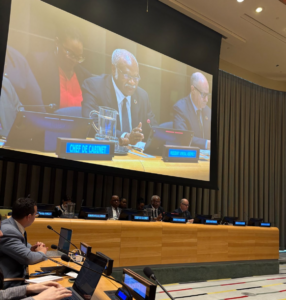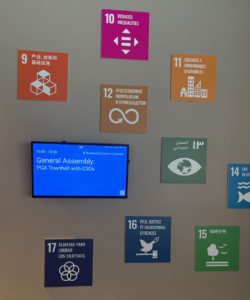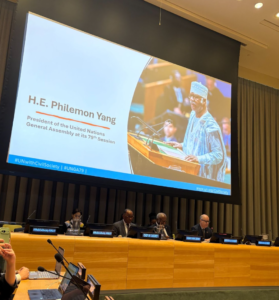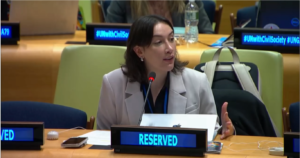Every few months, a Civil Society Town Hall is hosted at the United Nations Headquarters in New York City for civil society organizations to participate in. Most recently, a Civil Society Town Hall was hosted on 12 February 2025 in two parts, the first of which was a discussion with H.E. Mr. Philemon Yang of Cameroon, President of the UN General Assembly at its 79th Session, on his priorities and civil society engagement; and the second of which focused on the implementation of the Pact for the Future, upcoming UN communication priorities, and ways that civil society can become involved.
Human Rights Now’s UN Youth Representative, Larissa Truchan, was selected by the UN Department of Global Communications to ask a question directly to the UNPGA during the first part of this Civil Society Town Hall. Her question asked (which can be viewed in the UN Web TV Recording starting around 42:00) is roughly as follows:
“I had the opportunity to attend the Summit of the Future alongside so many youth leaders, and I was so happy to see that reform of the United Nations Security Council was actually being talked about. However, as we sat in these comfortable rooms having discussions, plausible genocide continued in Gaza, in Myanmar, and in China, and armed conflict continued in Ukraine, in the DRC, and in so many other places around the world. What does successful UN Security Council reform look like to you? What is an achievable timeline for UNSC reform? What should frustrated young people do in the meantime?”
In response, the UNPGA reaffirmed that the UN is necessary for the collective security for all people in the world. Specifically, the UNPGA praised the good work that the UN Security Council (UNSC) has done as an important organ of the UN over the past 80 years.
 However, the UNPGA also noted the need for the UN, including the UNSC, to adapt to accommodate today’s modern reality, given that the world is a very different place than it was in 1945 when the UN was created and the UNSC was put into place. For example, back in 1945 when the UN was founded, the UN only had around 50 members, compared to the 193 Member States that make up the UN today. The UNPGA recognized that many Member States in Africa and Asia did not exist in 1945 because they were not yet independent, including the UNPGA’s own country, Cameroon, which did not gain independence and become a UN Member State until 1960.
However, the UNPGA also noted the need for the UN, including the UNSC, to adapt to accommodate today’s modern reality, given that the world is a very different place than it was in 1945 when the UN was created and the UNSC was put into place. For example, back in 1945 when the UN was founded, the UN only had around 50 members, compared to the 193 Member States that make up the UN today. The UNPGA recognized that many Member States in Africa and Asia did not exist in 1945 because they were not yet independent, including the UNPGA’s own country, Cameroon, which did not gain independence and become a UN Member State until 1960.
The UNPGA urged that addressing today’s new modern reality is important for the UNSC to ensure that the UN becomes transparent, democratic, and most importantly accountable. One way offered by the UNPGA of how this can be achieved is through improved representation of underrepresented countries, groups, and regions in the UNS C, including representation of the African continent.
C, including representation of the African continent.
Given that all Member States must agree that we need to reform the UNSC and have their own ideas about what this reform should look like, the UNPGA acknowledged that UNSC reform will be challenging. Nonetheless, the UNPGA encouraged the UNSC to embrace these challenges, and urged young people to remain engaged both within the UN and within our own governments at home to push for UNSC reform.





